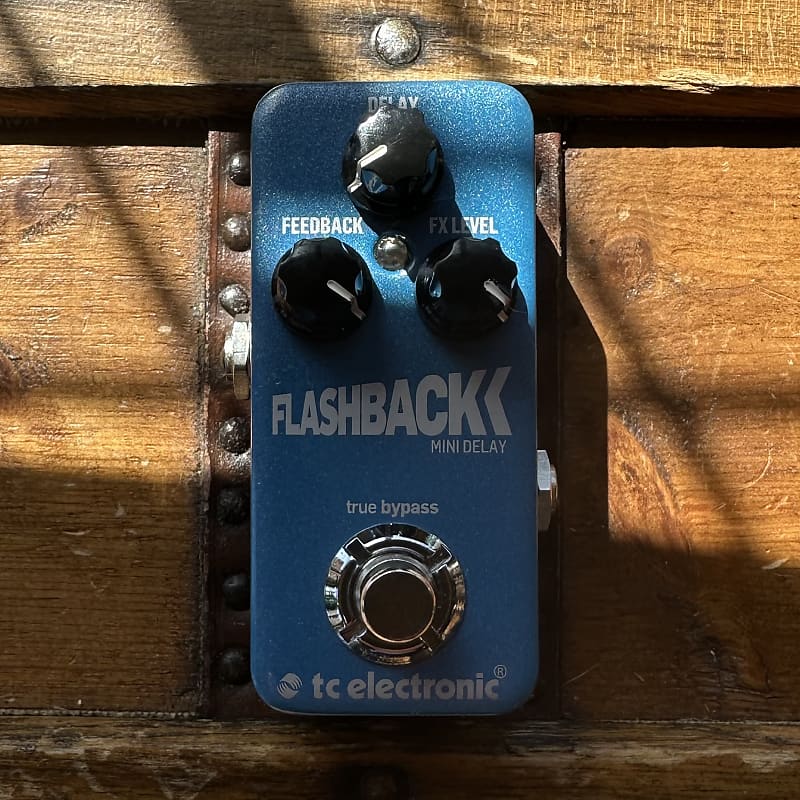If you had an Unicorn Account you could see a chart with the price development of this module and the average price asked for this module.
Imagine Neo, Trinity, or Morpheus plugging a guitar into a pedalboard in the Nebuchadnezzar, using the Flashback Delay to hack the Matrix’s sensory fabric. Here’s how it might work:Breaking the Repetition with Reverse DelayThe Flashback’s Reverse delay mode plays echoes backward, flipping time’s arrow. If déjà vu is a loop of the past intruding on the present, reversing the delay could scramble the Matrix’s attempt to repeat events. Instead of a cat walking by twice in the same direction, the second echo might sound like it’s unraveling—alerting the crew to the glitch without letting it settle into familiarity.Looper to Rewrite the ScriptThe 40-second looper could “record” the déjà vu moment—like Neo’s cat encounter—and overlay it with new sounds, effectively rewriting the Matrix’s code. By adding layers of overdubs, the crew could mask the glitch with their own narrative, preventing the Agents from using it as a trap. It’s a sonic counter-hack: if the Matrix repeats, they repeat louder and differently.Tape Delay’s ImperfectionThe Tape delay mode mimics vintage tape echoes with subtle warbles and degradation. In a Matrix context, this imperfection could exploit the system’s reliance on flawless repetition. By introducing analog-style flaws into the soundscape, the Flashback might make the déjà vu less convincing—exposing it as artificial when the “memory” doesn’t match the pristine simulation.Conceptual Tie-InIn The Matrix, combating déjà vu means staying one step ahead of the Machines’ control. The Flashback Delay, with its ability to manipulate time and perception through sound, becomes a metaphorical weapon. It doesn’t just echo the past—it reshapes it, giving the user (or rebel) control over the narrative. If déjà vu is the Matrix saying, “You’ve been here before,” the Flashback retorts, “No, I’m remixing it.” The pedal’s versatility mirrors the red-pilled crew’s adaptability—turning a glitch into an opportunity.Practical Guitarist’s SpinFor a guitarist in our world, using the Flashback to “combat déjà vu” might mean breaking creative ruts. If you’re stuck replaying the same old licks (a musical déjà vu), the pedal’s diverse modes—say, the 2290’s crisp digital repeats or the Mod delay’s lush chorusing—can jolt you into new territory, much like Neo dodging bullets. It’s less about fighting a simulated reality and more about escaping self-imposed loops.ConclusionThe TC Electronic Flashback Delay can’t literally hack the Matrix, but its time-bending features offer a playful way to imagine countering déjà vu’s glitches. Whether reversing echoes, layering loops, or shattering familiarity with crystalline tones, it’s a tool to seize control of repetition—both in sound and, in this sci-fi twist, in perception. So, next time you feel that eerie familiarity, maybe all you need is a green stompbox and a power chord to rewrite the code.

This offer was fetched from reverb.com. You cannot contact the seller via ModularGrid. You have to visit their site.
Look up onDisclaimer: Modules listed for sale on the ModularGrid Marketplace are offered explicitly by their respective owners. ModularGrid is not affiliated to the sellers and takes no legal responsibility in any transaction.
The internet is a rough place and fraudulent behavior can occur. If you are concerned about dealing with strangers consider buying your module at an authorized dealer.